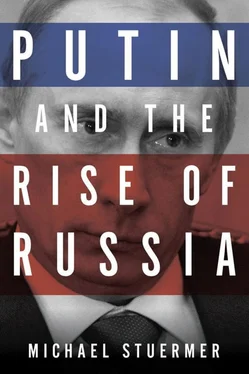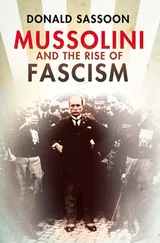When he came to geopolitics, Putin cited a sentence which I had written a few years before: ‘Between Western Europe and Russia there are only a few dotted lines while between Europe and America there is an Ocean.’ Although he was courteous enough to attribute it to me and it sounded innocent enough, the conclusion which Putin drew was very different from mine. He spoke of a natural affinity between Russia and Europe, Moscow and Berlin being the two centres of gravity. I had, on the contrary, concluded that, given the geographic distance across the Atlantic, it was especially important to invest a great deal of energy and imagination into the Atlantic relationship in order to prevent NATO nations from drifting apart. By the time Putin quoted me, I had forgotten the occasion which had prompted my original remarks. It was only years later, when I was sorting through old files, that I found the original source. It was a manuscript drafted for a NATO ambassadors’ meeting in Brussels, and not meant for wider circulation. Putin’s speech writer for that Reichstag address certainly had a dark sense of humour.
In September 2005 there was another meeting with Mr Putin, by now well into his second term, in the Oval Hall named after Catherine the Great in the Kremlin, a neo-classical masterpiece of perfect proportions. Catherine, the little princess from Zerbst who had become Tsarina after her lover Prince Orlov had killed her childish husband – ‘Mother, oh mother, he has fallen onto my sword’ – and rose to autocrat of all Russians, is perhaps the patron saint of the new Russia. In her own time she wanted to be celebrated as the Semiramis of the North. She sent lavish gifts to those Paris intellectuals of the Enlightenment who sang her praise. But she also suppressed without mercy the peasant uprising of Pugachev. In her tastes she remained wedded to the delicate charms of French and German neo-classicism. And while her latter-day successors buy Porsches and BMWs and Mercedes-Benz, she ordered governmental silver for all of Russia’s provincial capitals from Paris and Augsburg, furniture from the Roentgen factory at Neuwied on the Rhine and pictures from Philipp Hackert’s studio in Naples. Putin was late and the chief of protocol had to apologize. A Kremlin diplomat offered to show us other rooms, including the formal office of the President.
‘ Le style c’est l’homme ’ – if the old saying has any truth in it, Putin’s office provided some insights. In the centre was a big fireplace, accompanied by a pair of French dix-huitième gilded armchairs that would do honour to the Elysée in Paris. In front stood an equally antique desk, carrying a heavy inkwell of malachite. This was old Russian style, the bigger the better. More impressive were the greater-than-life-size statues of former rulers of the Kremlin, placed in all four corners of the room and looking down on their late successors. Peter the Great was the modernizing autocrat, turning Russia’s face to the west and south, ordering St Petersburg to be built and a Mediterranean escada created. Catherine II expanded the empire but was also famous for the flourishing villages that hardly existed but were a mirage invented by Prince Potemkin. Nicholas I was a tyrant who claimed a droit de regard over Germany and Europe and sent rebellious aristocrats, and especially the reform-minded Decembrist officers, into internal exile to Siberia. Alexander II was a reformer, cut short by assassination. What inspiration would incumbents gain from the brooding presence of those bronze figures overlooking his office? His answer might give a better clue as to Russia’s future than a thousand statistics.
In those Kremlin halls in 2005, Stalin and Lenin were conspicuous by their absence. There was no trace of the two great tyrants whose memory still haunts Russia – Lenin displayed in bronze in many a Russian city’s central square, while Stalin, except in his home town in the Caucasus, has become all but invisible. From their day only a portrait of Marshal Zhukov greeted the visitor, poorly painted from a photograph and impressive only in the double-breasted display of military decorations. All along the walls of the long corridors there were nineteenth-century gouaches and oil paintings much as in the manor house central to a Chekhov play. In the elegant waiting-room, richly endowed with insignificant Italian neo-Rococo white-painted furniture, a white-gloved butler served tea and biscuits to help the guests while away the time.
Then a brief walk to the Hall of Catherine. Name tags in English and Russian were prepared, within sight of the President. Suddenly he was among the guests, unannounced, greeting every one of them in his characteristic manner, head slightly bowed, his eyes like a laser beam examining everybody to determine whether friend or foe. He welcomed the guests and asked them to put questions to him or give their comments. Unlike the procedure in Soviet times, no question had to be submitted in writing. Every one of the twenty-five participants was free to ask whatever they pleased, most questions being rather on the tough side. But Putin seemed to like a sporting event. There was no one to slip him a note, no one daring to add to the President’s remarks, let alone act as a kind of expert mentor. Putin seemed comfortable with this kind of discussion and the participants in their majority obliged him by not spoiling the event with awkward questions about, say, the past and future of Chechnya or the country’s weak record in crime prevention. The man was obviously enjoying his role.
For just over three hours Putin explained Russia – Putin’s Russia – to this circle of Western experts. His messages were unequivocal. Stability is the leitmotif in his thinking. He demands predictability, from himself as well as from others. He thinks in terms of Russian raison d’état , but he would not deny that what is good for Gazprom is good for Russia Inc., the emerging super-corporation. Does he believe in political friendship? He knows – maybe inspired by Lord Palmerston – that great states have no permanent alliances but only permanent interests. Friendship is a personal matter.
Putin fills the grandiose frame of the hall named after the German tsarina, a manager of raison d’état – this is how he wanted to be seen by everybody around the table. The man in the grey flannel suit displays an impressive amount of both nervous energy and self-assuredness. His outward appearance – inconspicuous tie, no decorations, let alone adornments of any kind – would in the City of London be described as casual elegance. This man clearly wishes to be seen as a no-nonsense type. If there is a whiff of vanity it is that of a man who does not need to cut a colourful figure. He cultivates the air of the CEO of a global corporation. He is popular, his ratings are at an enviable – and plausible – 60 per cent, not the 99 per cent of the Soviet past, but also not the dwindling numbers that Western leaders tend to achieve after six years in office. The political train is on track, the oil price high, and rising, almost too good to be cheered in Moscow. Russian shares at the nearby stock exchange are soaring towards an all-time high. All of this works in his favour. Russians admire his luck and want to have a little share of it.
Russia’s strength stems from oil and gas, but it is also Russia’s potential weakness. Putin remembers that the Soviet Union went down, together with the world market price for oil in the mid-1980s, and that post-Soviet Russia was near collapse in 1998-90 when the oil price – the price for gas is, in most cases, pegged to oil – went, once again, down to a catastrophic US $10 per barrel. The reason was not a secular reversal of the terms of trade but a slight recession in the Far East’s roaring economies. The ensuing small reduction in demand translated into a major crisis of the oil market, a sharp decline in investment, and an economic disaster for most of Russia’s city dwellers. But ever since the oil price knew only one direction: up and up. However, Putin is painfully aware of the fact that Russia’s fortunes are inexorably dependent on stable prices, preferably well above $50 per barrel – but not too much, as consumer countries would then be forced to look for alternative energies, from nuclear to ethanol, from solar panels to maize. 1998-9 was the low point of Russia’s post-Soviet curve, and Putin knows how dependent on the world economy Russia is and how brittle the newly found wealth could be. Oil, Putin knows, can only be a bridge to a much more broadly based economy.
Читать дальше











